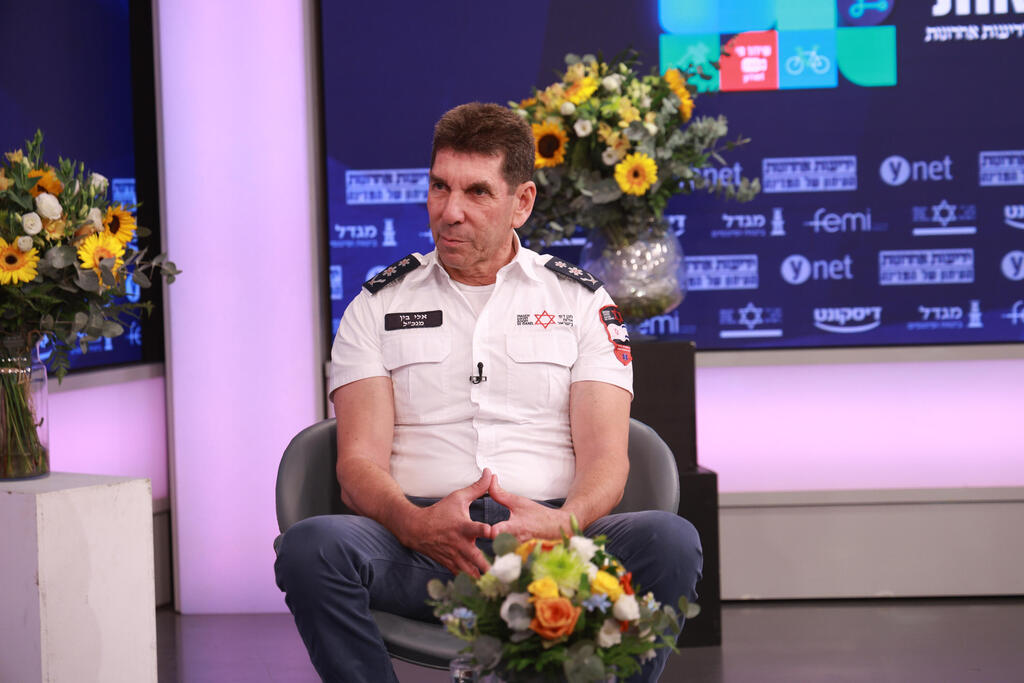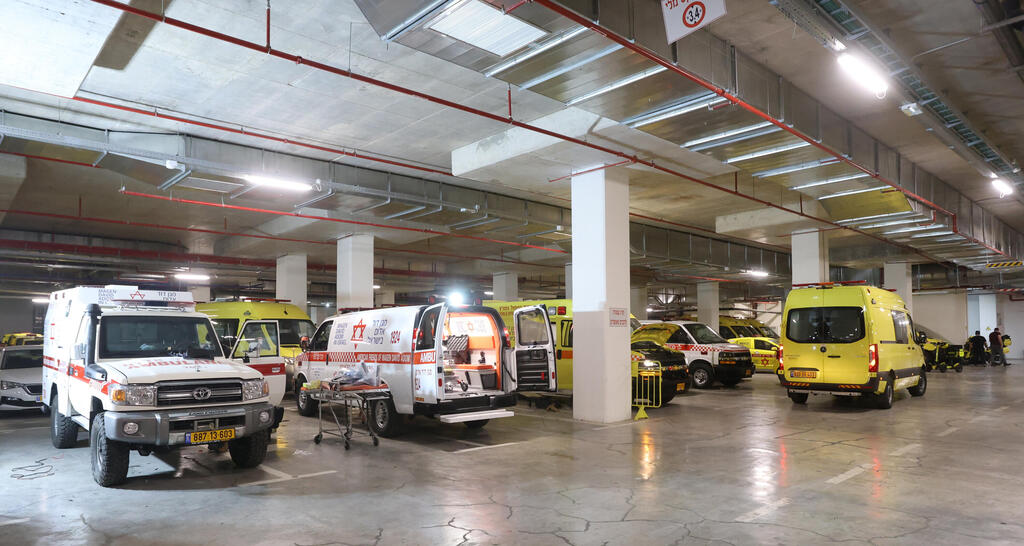Getting your Trinity Audio player ready...
Amid fears of security escalation between Israel and Hezbollah, Magen David Adom Director General Eli Bin criticized the chaos of the public health system before the October 7 massacre carried out by Hamas on Monday at the Ynet and Yedioth Ahronoth health conference. He warned the Finance Ministry, which handles the organization's budget, about what will happen if there are budget cuts to the group.
"There is no organization in Israel that is responsible for dealing with challenges such as earthquakes, natural disasters, wars or major car accidents, and it is not budgeted for," he said. "It doesn’t happen in the police, fire department, or the IDF, nor in any body worldwide expected to meet such challenges. We don’t need to discuss the challenge in the north; we all understand what’s going to happen there, but we’re not getting any budgets."
Bin explained that "during COVID-19, we saved a bit of money to build the Magen David Adom national headquarters to create an underground dispatch center capable of functioning during crises. Over the last five years, we built the blood bank, and if we hadn’t built it in time and managed to operationalize it during the war, it’s doubtful we would have been able to produce blood."
"We saved some money for the national headquarters we want to build, but now the Treasury wants to take those funds and divert them elsewhere. The budget isn’t allocated properly. The civil servants there are the ones actually controlling decision-makers, and the decision-makers don’t understand the importance of MDA. If we don’t have a stable budget and financial security, we simply won’t be able to provide an adequate service, to say the least," he added.
We are likely on the verge of a conflict in the north. With no budget, will we see a significant disruption to services there?
"I don’t want to complain during wartime, and I’m not one to do that, but I think that if the Finance Ministry doesn’t get its act together by tomorrow morning, it won’t find Magen David Adom anywhere. MDA workers, unlike the rest of the public sector that has received all their wage agreements, still haven’t received their 2023 salary agreement. I blame the Histadrut trade union as well – they bear responsibility for this. But it’s not only the Histadrut; the Finance Ministry needs to provide the necessary financial capabilities."
Where is the Histadrut in all this? What’s the chairman doing if not dealing with you?
"I’m very angry with the Histadrut leadership. They’re responsible for this failure, where MDA employees aren’t getting the budget needed for wage increases. Let me share a secret: I instructed my employees not to pay the Histadrut membership fees. Those funds are currently held by MDA. I’m not sure we can avoid a strike; this is right on the edge, but I’m against striking, especially at MDA. Sadly, they’ve put the workers in a situation where their rights are neglected when compared to other public sector workers. Every civil servant in the Finance Ministry and the Health Ministry receives this raise – only MDA employees don’t. It’s unfair; there are real problems here."
Are you expected to strike?
"No, we don’t want to get there. Both the Histadrut and the Finance Ministry have a responsibility to solve the problem. Histadrut chairman Arnon Bar-David and the leadership keep saying things will be fine. But this ‘everything will be fine’ attitude has meant that, for nine months now, people haven’t received the salary agreement they’re owed. It’s unfair and wrong, especially given that they’re sacrificing their lives and putting themselves at risk."
Ahead of a possible conflict with Hezbollah, Bin shared that, in the first week following the October 7 massacre, "we made a strategic decision to increase the organization’s stockpile of equipment and supplies to a four-month capacity. This includes everything. Additionally, we purchased satellite systems for all our stations and staff. We made significant moves, bringing in over 250 additional ambulances to Israel with the help of our donors and supporters. We launched a special program called 'Magen' that equips communities to handle emergencies in the first critical hour even before an ambulance arrives."
Amid criticism of the Finance Ministry and the Histadrut, Bin praised donors from around the world, both Jewish and Christian. "I must mention that evangelical Christians have been amazing. They donated two stations – one in Shlomi, an armored station, and one in Eshkol. They also brought in bulletproof ambulances. They took on refurbishing all the ambulances damaged in the recent war. They are truly incredible people. Alongside them are thousands of Jews worldwide – tens of thousands – supporting MDA. Without their support, it’s doubtful the organization could function and prepare for future events."
"We made dramatic decisions on October 7, even before 7:00 a.m."
Bin also shared his feelings on October 7th, describing how he initially thought the massive rocket fire from Gaza was a diversion. "I thought it was a distraction, and something was about to unfold from the north, that the surprise would come from there. I was thinking strategically. The moment the whole thing began and I received the call about alarms and rocket fire from the south, my first question was: 'Did something happen overnight? Did Israel take out someone?' They said no, it had been quiet. There was no reason for such massive rocket fire, and that’s when the red flag went up for me."
"In the first few minutes, I spoke with the Home Front Command general, and he had no information on what was happening. But in those initial minutes, we made three decisions that, in hindsight, we now know were critical and saved lives because they gave us the strategic ability to act in the first hours, and later, in a very effective, efficient, and substantial manner. The first decision was to keep the night shift, which was supposed to end at 7:00 a.m., on duty until further notice, and the morning shift, which was scheduled to start at 6:50 a.m., essentially became our force multiplier, providing the needed response.
"The second decision was to start calling in all personnel to the stations. That was a tough decision. I didn’t know the scale of the event, but I took full responsibility and said we’re going all out. Calling in thousands of employees on a Saturday is a huge financial cost, but I ignored the financial and economic considerations and said, 'Everyone comes in now, along with the volunteers.' The third and critical decision was to launch mass blood donations nationwide."
"It’s important to remember that blood drives can’t happen just anywhere, as rockets were also hitting central Israel, and we had to find safe locations. By 6:45 a.m., I had already contacted the director of Ichilov Hospital, Ronni Gamzu, and the CEO of Wolfson Hospital, Anat Engel, to ask for their venues for the blood drives. We executed these actions flawlessly."
Bin described how later he realized that the event was unprecedented in Israel when it became known that Hamas terrorists were shooting at medical teams in the field. "You don’t shoot at ambulances. The moment I learned that they shot at the ambulance and we lost contact with the EMT, I realized the rules of the game were completely different. We started getting situational updates from the police and the IDF, and we understood that many roads were controlled by groups of terrorists. We realized that we weren’t just facing normal weapons. On the roads, anyone traveling on them was simply murdered."
He praised the cooperation with security and rescue forces, especially the IDF. "We reported to all the relevant authorities – police, fire department, security teams. They’re all connected to MDA’s systems. I find it hard to judge the IDF's commanders, but the IDF went above and beyond to cooperate with MDA. There was a very healthy, beneficial dialogue, and this cooperation saved lives." Bin added: "We lost paramedics and staff, and 15 of our people were injured, some moderately and severely." He concluded, "With this event, we at MDA understand that our future operations must be different."




